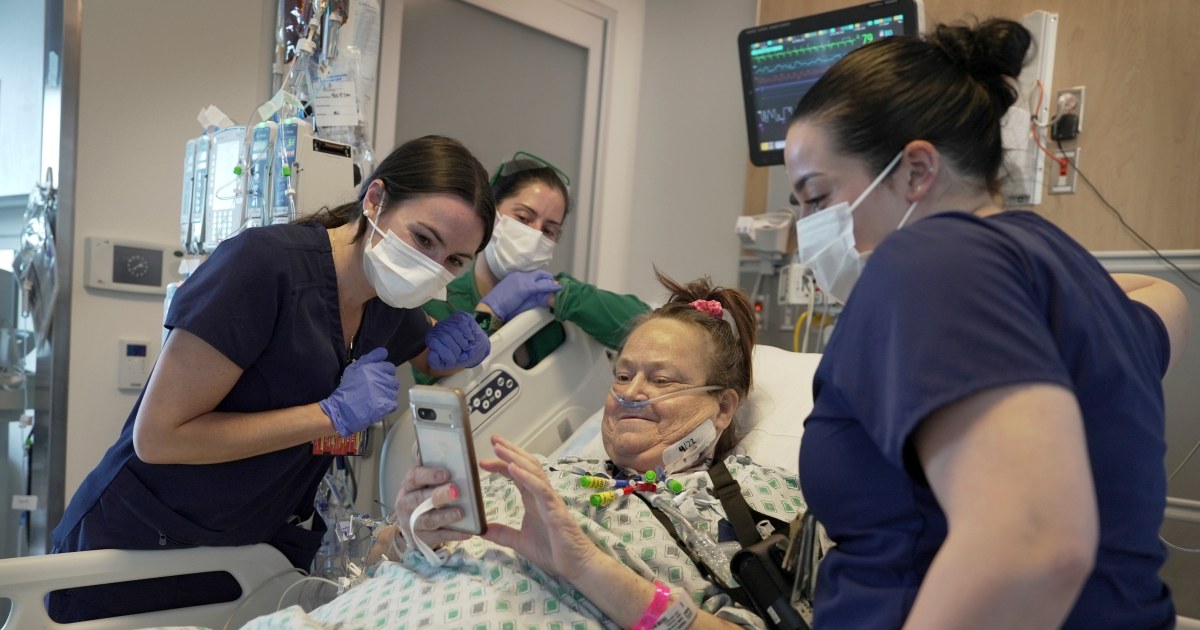A pig kidney was transplanted into a near-death New Jersey woman during a pair of dramatic operations that also stabilized her failing heart.
The combination of heart and kidney failure meant Lisa Pisano was too sick to tolerate a traditional transplant and had no options left.
Doctors at NYU Langone Health at New York University came up with a novel one-two punch: implant a mechanical pump to keep the heart beating and then transplant a kidney from a genetically modified pig.
Pisano is recovering well, the NYU medical team announced Wednesday. It is only the second case of a patient receiving a pig kidney — the first was last month at Massachusetts General Hospital — and the latest in a series of attempts to make animal-to-human transplantation a reality.
This week, the 54-year-old took a walker and took her first steps.
“I was at the end of the road,” Pisano told . “I took advantage of an opportunity. Worst case scenario, if it didn't work for me, maybe it would work for someone else and help the next person.”
Dr. Robert Montgomery, director of the NYU Langone Transplant Institute, recounted the joy in the operating room when the organ immediately began making urine.
“It has been something transformative,” he said about the initial results of the transplant.
But “we're not out of the woods yet,” warned Dr. Nader Moazami, the NYU heart surgeon who implanted the heart pump.
“With this operation, I can see my wife's smile again,” Todd, Pisano's husband, said Wednesday.
Other transplant specialists are closely observing the patient's progress.
“I must congratulate you,” added Dr. Tatsuo Kawai of Massachusetts General Hospital, noting that his patient receiving a pig kidney was in better overall health than NYU's before the operation. “When the heart is malfunctioning, it is really difficult to do a kidney transplant.”
The search for the porcine organ
In United States, the list of people waiting for an organ reaches 100,000. Most need a kidney and thousands die waiting. Given the shortage of donated organs, several biotech companies are genetically modifying pigs to make their organs more human-like and less likely to be destroyed by the human immune system.
NYU and other research teams have performed pig kidney and heart transplants into brain-dead bodies, and the results have been promising. The University of Maryland transplanted pig hearts into two men who had no other option and both died within months.
Last month's kidney transplant at Massachusetts General Hospital raised new hope. Kawai indicated that Richard Slayman suffered initial rejection, but recovered, was able to return home weeks ago and is doing well five weeks after the transplant. A recent biopsy showed there were no new problems.
A complex case
Pisano is the first woman to receive a porcine organ, and unlike previous xenotransplant experiments, she suffered from kidney and heart failure. She went into cardiac arrest and needed to be resuscitated before the experimental surgeries. She was so weak that she couldn't play with her grandchildren. “I was miserable,” said the Cookstown, New Jersey, resident.
Heart failure prevented him from receiving a traditional kidney transplant. But because he was on dialysis, he also couldn't receive a heart pump, called a ventricular assist device, or VAD.
“It's like being in a maze and you can't find a way out,” Montgomery said. Until surgeons decided to pair a heart pump with a pig kidney.
Two operations in eight days
With emergency permission from the United States Food and Drug Administration (FDA), Montgomery chose an organ from a pig genetically modified by United Therapeutics Corp. so that its cells do not produce a sugar foreign to the human body and that could generate rejection immediate.
And an additional modification: The donor pig's thymus, a gland that governs the immune system, was attached to the kidney in the hope that it would help Pisano's body tolerate the new organ.
Surgeons implanted the VAD to power Pisano's heart on April 4 and transplanted the pig kidney on the 12th of the same month. Although the long-term outcome cannot be predicted, so far it has shown no signs of rejection, Montgomery said. And by adjusting the VAD to work with his new kidney, Moazami added that doctors have learned lessons that could be useful for patients with heart and kidney failure.
The special “compassionate use” experiments hold many lessons for doctors, but rigorous studies will be needed to show whether xenotransplants really work. What happens with Pisano and the organ recipient at Mass General will undoubtedly affect the FDA's decision whether or not to allow such experiments. United Therapeutics said it hopes to start one next year.

